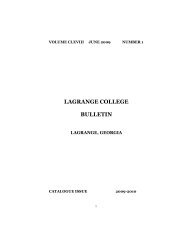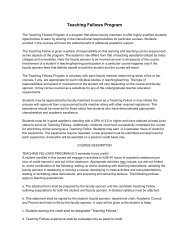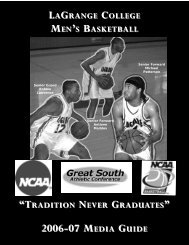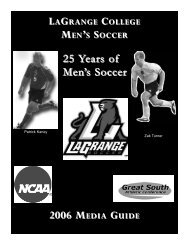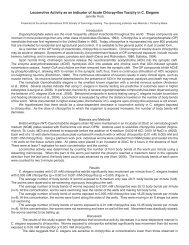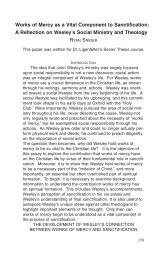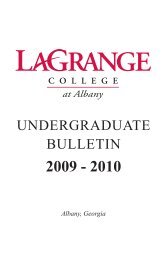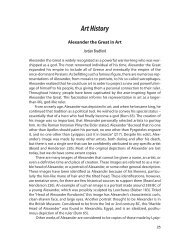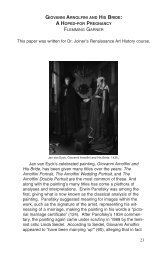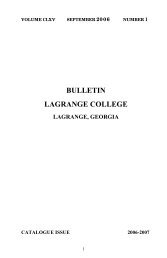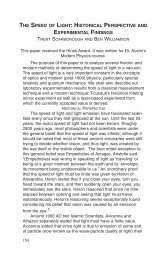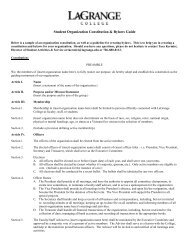undergraduate bulletin - LaGrange College
undergraduate bulletin - LaGrange College
undergraduate bulletin - LaGrange College
You also want an ePaper? Increase the reach of your titles
YUMPU automatically turns print PDFs into web optimized ePapers that Google loves.
HISTORY AND DESCRIPTION<br />
The history of <strong>LaGrange</strong> <strong>College</strong> is closely associated with the history of the City of <strong>LaGrange</strong><br />
and Troup County. When the vast tract of land lying between the Flint and Chattahoochee Rivers<br />
was secured by the Indian Springs Treaty of 1825 and was opened for settlement in 1827, one of<br />
the five counties formed on the western border of the state was named Troup in honor of<br />
Governor George Michael Troup.<br />
An act was passed by the Georgia Legislature on December 24, 1827, providing for the selection<br />
of a county seat. It was named ―<strong>LaGrange</strong>‖ after the country estate of the Marquis de Lafayette,<br />
the American Revolutionary War hero who had visited the region in 1825 as the guest of<br />
Governor Troup. The site for the town of <strong>LaGrange</strong> was purchased in 1828, and the town was<br />
incorporated on December 18, 1828. On December 26, 1831, the charter for the <strong>LaGrange</strong><br />
Female Academy was granted at the state capitol, then in Milledgeville.<br />
In 1831 Andrew Jackson was president of the United States. Abraham Lincoln was 22 years old.<br />
The Creek Indians had been moved out of this area of the state only six years earlier. The only<br />
other college in the state was Franklin <strong>College</strong>, now the University of Georgia.<br />
In 1847 the charter for the school was amended and the school became the <strong>LaGrange</strong> Female<br />
Institute with power to confer degrees. The name was changed to <strong>LaGrange</strong> Female <strong>College</strong> in<br />
1851, and in 1934 it was changed to <strong>LaGrange</strong> <strong>College</strong>. The <strong>College</strong> became officially<br />
coeducational in 1953.<br />
The first location of the school was in a large white building at what is now 406 Broad Street.<br />
The school moved to its present location on "the Hill," the highest geographical point in<br />
<strong>LaGrange</strong>, after the construction of the building now known as Smith Hall in 1842.<br />
The <strong>College</strong> was sold to the Georgia Conference of the Methodist Episcopal Church South in<br />
1856. Today it is an institution of the North Georgia Conference of the United Methodist<br />
Church.<br />
Strong in the liberal arts, <strong>LaGrange</strong> <strong>College</strong> has an outstanding reputation in pre-professional<br />
programs, including pre-medical and allied fields, pre-law, pre-theology, and pre-engineering.<br />
<strong>LaGrange</strong> <strong>College</strong> offers the Bachelor of Arts degree with sixteen (16) majors, the Bachelor of<br />
Science degree in five (5) areas, the Bachelor of Music, and the Bachelor of Science in Nursing<br />
degree. The Master of Arts degree in Teaching, the Master of Education degree in Curriculum<br />
and Instruction, and the Specialist in Education degree in Curriculum and Instruction are offered.<br />
The Evening program offers the Bachelor of Arts degree in four (4) areas.<br />
<strong>LaGrange</strong> <strong>College</strong> operates on the modified (4-1-4) semester system for day classes. In addition,<br />
there is an evening session during the regular year and in the summer. During the regular school<br />
year, the night classes follow a modified quarter system. The summer is divided into two (2)<br />
sessions of day classes and one (1) seven-week session in the evening. For all day classes, credits<br />
earned are semester hour credits.<br />
The <strong>College</strong> draws more than half of its student body from Georgia. However, students from at<br />
least one-third of the other states in the U.S. and from abroad nourish a rich cosmopolitan and<br />
international community that includes various religious and ethnic backgrounds.<br />
Students also are provided diversity opportunities through travel courses, field study programs,<br />
service-learning, and internships. Students in the <strong>College</strong>'s Education and Nursing departments<br />
5



